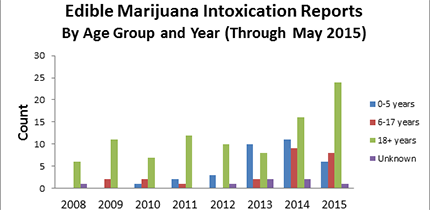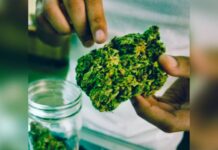 An increasing number of King County residents are being poisoned by eating edible marijuana products, and health officials warn that children are particularly at risk. According to the Washington Poison Center (WAPC), the number of marijuana edible intoxications reported in King County in 2014 was 73% higher than in 2013, and there is an upward trend in 2015. Children 5 years of age and younger accounted for roughly 30% of all edible marijuana intoxication reports in 2014. Seventy-three percent of children required evaluation at a hospital.
An increasing number of King County residents are being poisoned by eating edible marijuana products, and health officials warn that children are particularly at risk. According to the Washington Poison Center (WAPC), the number of marijuana edible intoxications reported in King County in 2014 was 73% higher than in 2013, and there is an upward trend in 2015. Children 5 years of age and younger accounted for roughly 30% of all edible marijuana intoxication reports in 2014. Seventy-three percent of children required evaluation at a hospital.
“Edible marijuana poisoning is an emerging health risk to children in our community that demands attention,” said Dr. Jeff Duchin, Health Officer for Public Health – Seattle & King County. “Edible marijuana consumers, sellers and health care providers should all take steps to prevent children from getting access to these products.”
Most intoxications among children occur when a child finds marijuana-containing products such as candy, chocolate or baked goods left unattended in the home. In 2014, children under the age of 18 years accounted half of intoxication reports related to chocolate and candy edibles, and more than a quarter of reports related to ingestion of marijuana-containing baked goods.
“The majority of pediatric poisonings occur unintentionally. Marijuana edibles left lying around on the coffee table or next to snacks can easily fall into the hands of young kids,“ said Dr. Alexander Garrard, Clinical Managing Director of the Washington Poison Center. “Children should be supervised, and marijuana edibles should be left up high out of reach of kids or locked in cabinets.”
Marijuana intoxication in children can lead to anxiety attacks, psychotic-like symptoms, seizures, and respiratory depression. Although most cases do not require hospital admission or result in serious illness, children often require extensive and costly medical evaluations to rule out other causes of their symptoms.
“Marijuana intoxication in children can be serious, requiring medical evaluation and occasionally, hospitalization,” said Dr. Suzan Mazor, director of toxicology and an emergency room attending physician at Seattle Children’s Hospital. “We need to prevent kids from getting ahold of edibles and to stop producing edible marijuana in packaging that resembles candy and treats that are attractive to children.”
Key prevention steps:
- Adults should all take steps to prevent children from marijuana intoxication and gaining access to edible marijuana.
- Purchased and homemade edible marijuana products should be stored away from where children can see and gain access to them. Use containers that are securely sealed and not see-through. Consider putting “Mr. Yuk” stickers on the containers. Stickers may be ordered from the Washington Poison Center website: http://www.wapc.org/
- Adults should avoid buying edible or infused marijuana products that appeal to children or look like commercially available non-marijuana products (including cakes, cookies, candy and sweets such as lollipops and gummy bears). If such products are sold, retailers should inform customers regarding safeguarding edible products from children and the potential for serous health consequences for children who consume marijuana.
- Physicians who prescribe marijuana for medical conditions should counsel patients regarding safeguarding edible products from children and the potential for serous health consequences for children who consume marijuana.
- Parents and others who need advice about possible marijuana poisoning should call Washington Poison Center at 1-800-222-1222 number (Consider pre-programming the Poison Center telephone number in your cell phone).
Increasing incidents of intoxication reported to WAPC:
Total (adults and children):
- 39 incidents reported so far in 2015 (through May)
- 38 incidents in all of 2014
Among children 0-5 years of age there were
- 6 incidents reported so far in 2015
- 11 incidents reported in 2014,
- 10 incidents reported in 2013
- 3 incidents reported 2012
Among children ages 6-17 years:
- 8 incidents reported so far in 2015
- 9 incidents reported in 2014
- 2 incidents reported in 2013
- Between 0-2 cases between 2008-2013
Intoxication reports to WAPC is voluntary and therefore these data likely represent an underestimate of the true number of cases of adverse events related to marijuana ingestion.















